|
|
|
Sort Order |
|
|
|
Items / Page
|
|
|
|
|
|
|
| Srl | Item |
| 1 |
ID:
181955
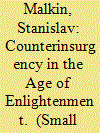

|
|
|
|
|
| Summary/Abstract |
One of the first and closest ‘laboratories’ of the British Empire in terms of turning the British army into a colonial institution during protracted counterinsurgency was one of the inner Gaelic fringes of the United Kingdom, the Highlands of Scotland. It was there in the first half of the Eighteenth century that the army appeared as a corporate institution with its own views not just on its role in the defeating the Jacobite movement, but in resolving the ‘Highland Problem’, acquiring and applying militarily useable topographic and ethnographic knowledge as well as coercive power. The military presence in the Highlands of Scotland was based on intelligence, collaboration with local allies, social control and working civil-military relations, despite the lack of the unity of command during the whole period of the Jacobite movement. This was the dark side of the Enlightenment: the growth of knowledge about rebellious populations of the European empires that had been tested on the lines of ‘enlightened’ pacification and added to the toolbox of colonial counterinsurgency. It would help shape later methods of colonial counter-insurgency in the next century.
|
|
|
|
|
|
|
|
|
|
|
|
|
|
|
|
| 2 |
ID:
181954
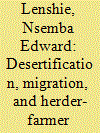

|
|
|
|
|
| Summary/Abstract |
While previous studies have focused on how political and economic factors fuel herder-farmer conflicts, there is a dearth of knowledge on how desertification-induced migration amidst ungoverned spaces affect herder-farmer conflicts in Nigeria. Using data from qualitative dominant mixed method, this study interrogates how desertification-induced migration and state failure to provide security governance affect herder-farmer conflicts in Nigeria. It argued that poor security governance escalates the southward migration of herders and contributes to the intensification of herder-farmer conflicts in Nigeria. These conflicts endanger livelihoods, fuel population displacements, and undermine human security. The study concludes that effective security governance amidst increased desertification in Northern Nigeria presents an opportunity for regulating southward migration of herders, mitigating herder-farmer conflicts, and promoting human security in Nigeria.
|
|
|
|
|
|
|
|
|
|
|
|
|
|
|
|
| 3 |
ID:
181961
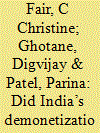

|
|
|
|
|
| Summary/Abstract |
On 9 November 2016, India’s Prime Minister Narendra Modi announced his ‘demonetization’ policy which rendered all Rs. 500 and Rs. 1000 notes null and void. His government claimed that this policy, among other things, would curb stone-pelting in India’s restive Jammu and Kashmir by rendering valueless the copious illegal currency that, according to India, Pakistan pumped into the state to pay protestors to throw stones. Subsequently, New Delhi claimed success despite countervailing evidence for this claim. Here, we assemble a novel dataset to evaluate these assertions. After controlling for other factors that may explain variation in stone-pelting, we find that demonetization corresponded to increased stone-pelting. This finding is important for at least two reasons. First, Indian efforts to depict all protests in Jammu and Kashmir as the result of Pakistani payments both delegitimize Kashmiris’ grievances by reducing them to anti-state behaviors and diminish public appetite for addressing those grievances. Second, the current populist Indian government, which caters to Hindu nationalists, selectively curates facts to justify its actions, big and small, to the detriment of democratic accountability and governance.
|
|
|
|
|
|
|
|
|
|
|
|
|
|
|
|
| 4 |
ID:
181960
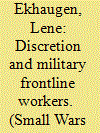

|
|
|
|
|
| Summary/Abstract |
This article explores how military ‘frontline workers’ use their discretion to interpret and then comply, breach or bypass policies that reach into the tactical level, and why. Based on extensive primary sources including in-depth interviews, end-of-tour reports and data from records, the case study explores the implementation of policies on civil-military relations by military commanders in the Norwegian-led Provincial Reconstruction Team (PRT) in Afghanistan in 2005–2012. This article finds that the commanders used their considerable discretion to implement policies that parted from national directives. In doing so, the Norwegian military strove to align their approach with close allies and NATO and became actual policy-makers. This article contributes to the debate on how western militaries behave at the tactical level by employing the concept of ‘discretion’.
|
|
|
|
|
|
|
|
|
|
|
|
|
|
|
|
| 5 |
ID:
181958


|
|
|
|
|
| Summary/Abstract |
Insurgencies are routinely conceptualised using a binary opposition between states and rebels. However, this neglects the complexity of their interaction, especially their collaboration. Although rebel-state collaboration is found throughout the history of insurgency, we lack a full explanation of why it occurs. This article endeavours to take the first step in developing a comprehensive theory by analysing rebel-state collaboration in two heuristic case studies: Afghanistan and Syria. Through process tracing, we find four mechanisms that can explain collaboration: 1) to prevent a costly military stalemate, 2) to gain or maintain legitimacy, 3) because external threats incentivise a mutually beneficial alliance, and 4) because both have to operate under the constraints of the pre-existing political economy. The relative weight of each varies, reflecting the fluid and contextual nature of wartime political orders. Contrasting with more popular explanations, we argue rebels and states are willing to collaborate even when the other benefits too, providing they believe their relative gains would be higher than their opponents, or the costs of competing would be too large. In providing a fuller explanation of rebel-state collaboration, we advocate a rethink about how to capture and analyse the complex and dynamic interactions between rebels and states.
|
|
|
|
|
|
|
|
|
|
|
|
|
|
|
|
| 6 |
ID:
181957
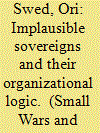

|
|
|
|
|
| Summary/Abstract |
The havoc and disarray among governments and societies caused by the COVID-19 outbreak also invited opportunities for violent non-state actors to exploit for their advantage governments’ failure to provide an adequate public health response or their denigration of security apparatuses due to the outbreak. Focusing on the early months of the outbreak, this study examines three courses of actions taken by those actors and the potential explanation for the variation in responses. The responses examined are actors offering COVID-related public health response as a surrogate for the state, the extension of hostilities, and the request for a ceasefire. Looking at a sample of 72 groups we suggest that the actors’ governance levels, which dictate their organizational logic and behavior, are strong predictors for the likelihood of them offering public health support, conduct attacks, or pursues a ceasefire during the period examined.
|
|
|
|
|
|
|
|
|
|
|
|
|
|
|
|
| 7 |
ID:
181953
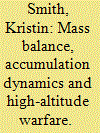

|
|
|
|
|
| Summary/Abstract |
Since 1984 the Indian and Pakistani armies have been locked in the world’s highest war on Siachen Glacier in the Karakoram Himalaya. This remote location is the world’s only nuclear trijunction as well as a source of drinking water for significant portions of India and Pakistan, and its possession is considered by both governments to be key to their national security. In the past, alpine battles were fought predominantly on glaciers with a precipitation-dominated accumulation type; Siachen, however, gains most of its new ice mass from avalanches and icefalls. This has presented unique challenges in tactics and logistics, rendering many of the strategies of modern conventional warfare useless, and the style of mountain warfare these challenges have produced has impacted both the combatants and the glacier itself. Existing literature on Siachen, while it discusses the verticality of the conflict, has done little to analyze the singular nature of warfare on a high-altitude glacier with an avalanche-heavy accumulation type. This paper draws on USGS Landsat data, glaciological mass balance studies, hydrological studies, firsthand combat accounts and historical reviews of the region to examine the unique tactics, logistics and impact of warfare on Siachen Glacier.
|
|
|
|
|
|
|
|
|
|
|
|
|
|
|
|
| 8 |
ID:
181959


|
|
|
|
|
| Summary/Abstract |
The aim of this investigation is to answer the crucial question of whether private military and security companies (PMSCs) affect conflict onset. It draws on the recently released Private Security Events Database, containing data on PMSC-related events across Latin America, Africa, and Southeast Asia. Employing a Cox Proportional Hazard model, the article explores whether the presence of PMSCs, the duration of PMSC presence, the type of service provided, and the number and type of clients affect conflict onset. Overall, the presence of PMSCs increases the likelihood of conflict onset, although its substantial effect was slight.
|
|
|
|
|
|
|
|
|
|
|
|
|
|
|
|
| 9 |
ID:
181956


|
|
|
|
|
| Summary/Abstract |
Cultural assets are equally important for COIN effectiveness. Despite the significant impact of culture on COIN outcomes, the extant literature pays too much attention only to strategic culture, not the inherent roles for culture to play. This paper examines what made South Korean COIN forces successful in Vietnam. First, they benefitted from cultural harmony driven by the shared belief in communalism culture, a common ground between both societies. Second, their own Jeong culture, which is part of the communalism-oriented idea, motivated South Korean soldiers to develop creative remedies to win the hearts and minds of the local population.
|
|
|
|
|
|
|
|
|
|
|
|
|
|
|
|
|
|
|
|
|